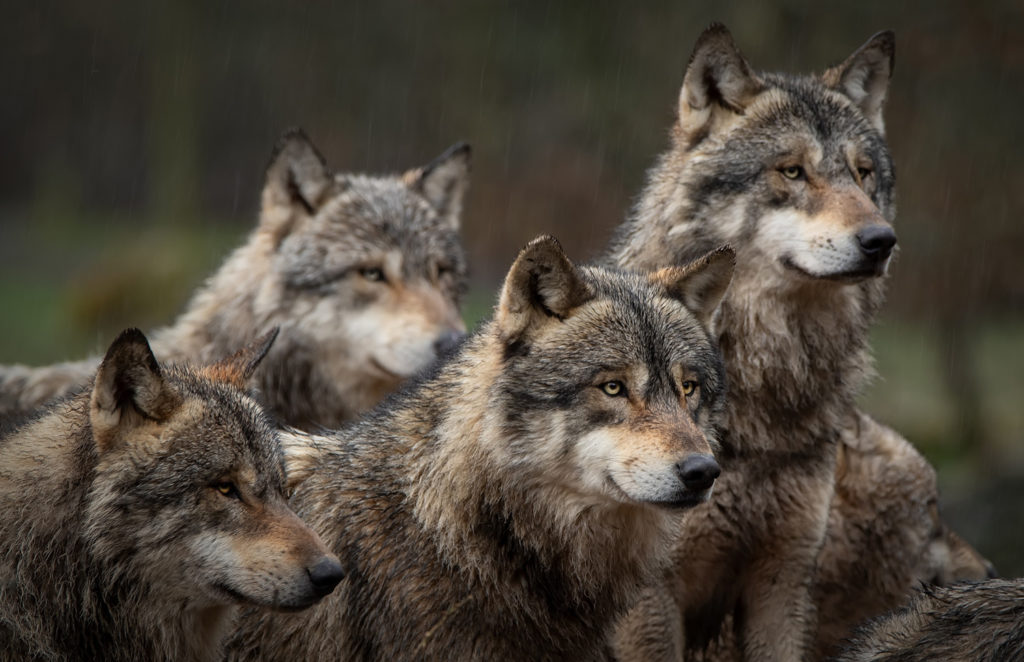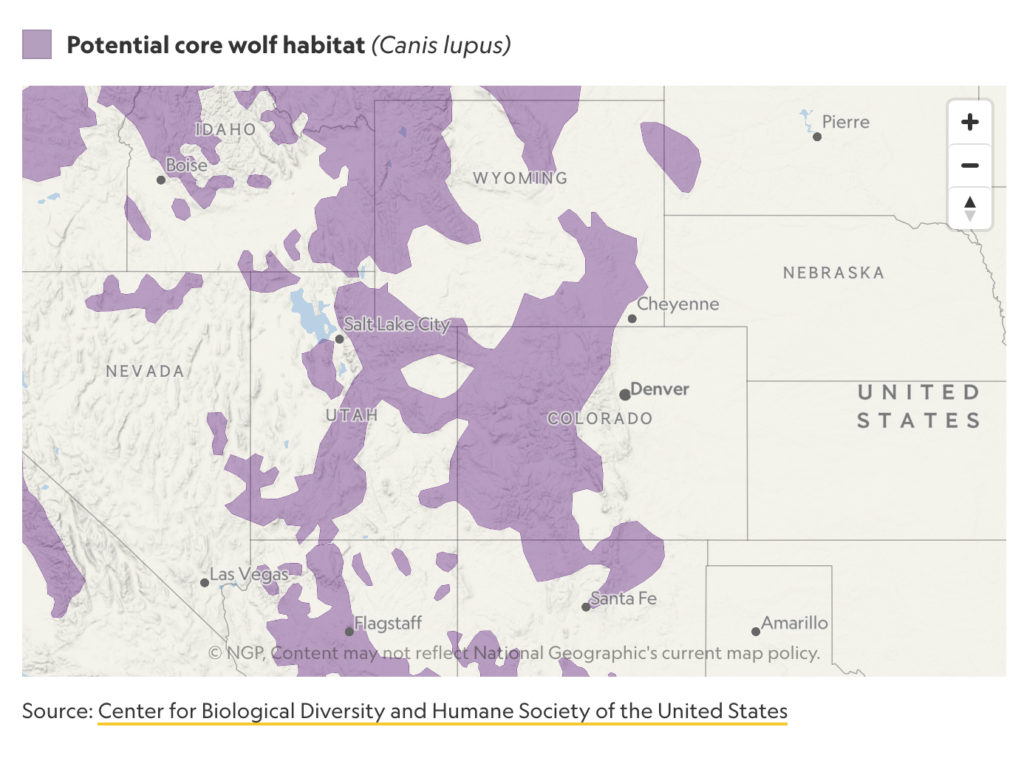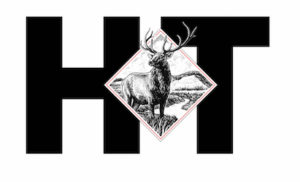CPW sticks to three-year timeline, for now

RBC | The 11-member Colorado Parks and Wildlife Commission hosted two days of virtual meetings Jan. 13 and 14, with approximately eight of 18 total hours allocated to discussing an adaptive management plan for wolf reintroduction.
The passage of Proposition 114 last November, also known as the Gray Wolf Reintroduction Initiative, paved the way for Colorado Parks and Wildlife (CPW) to bring wolves to the state. Colorado’s urban counties drove the measure through by 56,986 votes, 1.82% of the total votes cast.
In Rio Blanco County, 87.82% voters were against the measure.
TIMELINE
After passage, CPW honed in on a three-year plan to meet a Dec. 31, 2023, due date to begin reintroduction. This deadline was laid out in the legislation.

Governor Jared Polis challenged the commission during the Jan. 13 meeting to “fulfill the effort ahead of schedule … I think next year is that sweet spot.” Polis referenced the federal delisting and the change in federal administration as reasons to speed the process along. “I’ve talked to the governor of Wyoming. They’re happy to send us some wolves when we’re ready, I think other states are as well. So that’s the law of Colorado, a clear directive from the voters. We’re ready to do it.”
Commission Chair Marvin McDaniel, a retired Xcel Energy employee, thanked the governor for his support of CPW and stated they were eager to tackle the topic as “the will of the people.”
“We’re not going to allow re-litigation of this topic,” McDaniel stated. “At the same time, we need a thorough reintroduction and management plan so we know that the ultimate reintroduction will be very successful.”
“They don’t have the ability to re-litigate it. The voters have decided, but they could have constructive input and we want to make sure that voices are listened to,” Polis replied. He outlined a desire for a draft plan by spring/summer of 2021, in-person and virtual listening sessions across the state in the fall, and implementation of the plan in early 2022.
Development of wolf conservation and management plans in other states have taken three to five years.
Commissioner Carrie Hauser of Glenwood Springs asked for extra outreach efforts on the Western Slope. “I have said a number of times that we want to do this as a state and not to have this be done to the Western Slope and have this be a division of our state.”
Hauser is the president and CEO of Colorado Mountain College.
Polis agreed to aim for “sufficient number and geographic diversity of listening sessions for input” but also said the state would want to hear from residents where wolves won’t be taking up residence, including the eastern slope and the front range. The Western Slope is considered ideal wolf habitat. (See map below.)
DELISTING AND RELISTING
The reintroduction could be complicated by the recent delisting of wolves as a federal Endangered Species, according to Lisa Reynolds, First Assistant Attorney General.

As of press time, six environmental groups have filed a lawsuit over the federal delisting of wolves, including Defenders of Wildlife, the Center for Biological Diversity, Sierra Club, National Parks Conservation Association, Oregon Wild and the Humane Society of the United States.
Reynolds cautioned that any litigation would be “incredibly extensive” and could take “potentially years.” Right now, the CPW commission is the lead agency on wolf reintroduction. If environmental groups are successful in relisting wolves federally, however, control of Colorado’s wolf population will be taken away from state wildlife officials and returned to the federal government.
Wolves are still listed as endangered by the state of Colorado, meaning the take of wolves is prohibited except as permitted for scientific (zoological, educational or other scientific) purposes, or to protect human health or alleviate property damage.
According to Reynolds, those types of permits don’t currently exist. “You have to adopt a regulatory program that sets up a structure within which the Division can issue these permits,” she told the Commission. “You’re going to have to make it up as you go along.”
The state listing could be lifted in theory, but it would leave CPW in uncharted legal waters. Generally, species listed as endangered by states are also listed under federal law, making this an unusual situation. “As soon as they are doing well enough in Colorado, it’s up to the commission to decide whether or not they need to be taken off the list.”
POTENTIAL 10(j)
Another topic discussed by the Commission was a possible “pre-listing 10(j)” rule for wolves. According to the U.S. Fish and Wildlife Service, a 10(j) is a conservation tool used to designate the population of a listed species as “experimental” if it is released into a suitable natural habitat outside the species’ current range. Under a “nonessential experimental” 10(j) designation, a different set of rules governs the take of the species and provides flexibility for management. 10(j) rules require formal federal rule-making and NEPA analysis, and are often subject to litigation. A “pre-listing” would be a new concept and would only take effect if gray wolves are relisted as a federally endangered species.
Commissioner Charles Garcia of Denver approved of the idea. “There is a huge concern about putting these wolves on the ground and then they’re relisted. A very lengthy, serious 10(j) should almost be a prerequisite,” he said.
PROP 114 REQUIREMENTS AND COST
Legal requirements imposed by Prop 114 include:
- holding statewide hearings
- developing a plan to restore and manage wolves that is designed to resolve conflicts with ranching and farming interests (without imposing restrictions on land, water or resource use on private land)
- submittal of a report to the general assembly that includes whether introduction will impair the existing use of private land
- steps to begin reintroduction of wolves by Dec. 31, 2023
- overseeing wolf restoration and management
The final requirement includes specific language about obtaining periodic public input to update the plan as well as distributing state funds to address wolf-livestock conflicts. Just where those funds will come from is still speculative.
As far as immediate costs, Prop 114 increases state funding by approximately $300,000 for the 2021-22 budget and $500,000 for the 2022-23 budget. Spending then increases to about $800,000 a year for the implementation of the reintroduction plan. “Costs will be paid primarily from hunting and fishing license fees or appropriations made by the state legislature,” the proposition’s fiscal impact statement reads, adding that actual costs will depend on finalized plan details and the amount of livestock losses caused by wolves.
ABOUT WOLVES
After Reynold’s legal discussion, Eric Odell, Species Conservation Program Manager, presented facts about wolves to the commission. Discussion included the elimination of wolves from the landscape in the 1940s, expected effect of wolves on chronic wasting disease (neutral, according to Odell), the specific subspecies of wolf to be introduced, concerns about intermingling with the Mexican wolf population and depredation.
Commissioner Marie Haskett of Meeker, owner and operator of JML Outfitters and Horse Crazy camp for kids, asked Odell about lower reproductive rates in elk herds where wolves are present, but Odell could not give specifics. “What we hear from the Northern Rockies states is they maintain robust game populations and there are also expected to be direct and indirect impacts,” he said.
Commissioner Jay Tutchton of Hasty (Bent County) asked if wolves kill recreationally. Odell stated he did not have experience in the matter, but that he thought it was less likely with ungulate populations and more likely with livestock. Odell mentioned looking for wolves that have not been widely exposed to livestock. “We don’t want to start off with a problem.”
STAKEHOLDER ENGAGEMENT
Mike Quartuch, CPW’s Human Dimensions/Specialist Researcher, gave a presentation to help guide the stakeholder engagement process.
Haskett stated, “There are 64 counties, with only 13 voting for this issue and all of those metropolitan. We need to proceed carefully and not divide rural and urban Colorado. Colorado has over 50% private land and wildlife rely on that. Stakeholders need to be heard and we need to work many in-person meetings to do this.”
A CPW press release outlines plans for public meetings to be held across the state to collect public input, as well as formation of a Technical Working Group (TWG) and a Stakeholder Advisory Group (SAG). According to the press release, the TWG will propose objectives and strategies for CPW to incorporate into their draft plan, as well as develop details of damage prevention and compensation.
CPW Director Dan Prenzlow, in consultation with the Commission, will approve members of both the TWG and SAG.
Member representation on the TWG may include:
- Colorado Parks and Wildlife (CPW)
- U.S. Fish and Wildlife Service (USFWS)
- USDA Animal and Plant Health Inspection Service (APHIS)
- USDA U.S. Forest Service (USFS)
- Bureau of Land Management (BLM)
- Colorado Department of Agriculture (CDA)
- Tribal representation
- Other state or federal agency representation as deemed appropriate
- Parks and Wildlife Commissioner; as ex-officio/non-voting
The SAG will consist of a “diverse and inclusive membership that is balanced between interest areas” and will make contributions for consideration to the TWG.
The SAG group will consist of:
- Stakeholders representing wolf advocacy groups
- Livestock producers
- Representatives of local/county government
- Members at-large/ representatives of general citizens
- Representatives of environmental interests
- Sportspersons
- Academic institutions/Cooperative Extension
Ex-officio/non-voting members on the SAG committee may also include CPW commissioner(s), the Executive Director of the Department of Natural Resources or a designee, the director of CPW or a designee, and the commissioner of agriculture or a designee.
Decisions will ultimately be made by the CPW commission. Contact information and meeting schedules are available at https://cpw.state.co.us/aboutus/Pages/Commission.aspx
To participate in the Stakeholder Advisory Group, check CPW’s Wolf Management Page (https://cpw.state.co.us/learn/Pages/CON-Wolf-Management.aspx) or CPW’s social media feeds for further information.
PROPOSED PROCESS
Reid Dewalt, Assistant Director, outlined the proposed process, which includes hiring an external facilitator to manage stakeholder and technical advisory groups, statewide hearings and public comment opportunities. Hauser asked who would pay for the facilitator, and CPW Director Dan Prenzlow stated the cost could fall onto CPW if no alternative funding source could be found. “The big elephant in the room is who is paying for all of this,” Hauser said. “I think the costs related to this are going to be greater than anybody anticipated.”
The process consists of a two-phase, three-year timeline (see above graphic).
Commissioner Taishya Adams of Boulder requested that language around specific years be changed to something more flexible.
PUBLIC COMMENT
The amount of public comment received was “overwhelming” according to comments by several commissioners, and 31 people signed up for two minutes each to provide oral comments.
Rio Blanco County Commissioner Gary Moyer advocated for a full NEPA process and urged the CPW commission to “do the right thing.”
“I think it’s naive to think that the introduction of an apex predator is not going to affect federal lands and I really strongly encourage you to do the right thing and that includes having the federal government go through the NEPA process. This is a very serious issue and this affects the livelihood of our citizens.”
White River Conservation District Manager Callie Hendrickson urged the commission to hold in-person sessions in communities most affected, and to use the opportunity to improve trust and reduce division in the state by following a well thought out and specific plan instead of rushing through the process.
Other local speakers included area rancher and outfitter Lenny Klinglesmith and Elk Creek Ranch outfitter Colton Brown, Moffat County commissioner Donald Broom and Garfield County Commissioner John Martin.
After public comments, the Commission ultimately decided to stick with the proposed three-year timeline by a vote of 10-1, with Commissioner Adams voting no after her request for more flexible verbiage was not agreed to.
The potential for a faster or slower timeline remains as the plan evolves. “It is within the purview of the Commission to either speed up or slow down the planning process,” a CPW press release reads.
Virtual meetings will be held from February to May 2021 “to share information with the public and stakeholders and to provide opportunities for public input.” Also watch for opportunities to comment in the summer of 2022 and 2023 as draft plans are released.
The full proposed blueprint for public involvement can be viewed at https://cpw.state.co.us/Documents/Commission/2021/January/Item.29-3_Year_Memo_1-7-2020.pdf
Full videos of the meetings are available on the CPW YouTube channel.
Watch the Jan. 13 meeting at: https://www.youtube.com/watch?v=nL7T41_cpxc
Watch the Jan. 14 meeting at: https://www.youtube.com/watch?v=qKTUrazqiY0&t=24025s
By CAITLIN WALKER | [email protected]



















